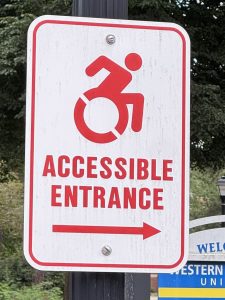WNE Professor Highlights Need for Modernized Accessibility Symbols in Massachusetts
SPRINGFIELD — Erin Murray, associate professor of Occupational Therapy at Western New England University (WNE), is leading an important conversation around how disability is portrayed — and why that portrayal matters.
Through her work with WNE’s B.E.A.R. P.A.W. Center (Bringing Equity, Accessibility, and Rehabilitation to People Achieving Wellness), one of the first student-run pro bono occupational therapy clinics in the country, Murray is helping to shift the narrative toward more accurate and empowering representations of disability.
“I want our students — especially those entering healthcare, education, or communication fields — to understand that the language and imagery they use has real impact,” Murray said. “When we elevate lived experiences and challenge stereotypes, we create a more inclusive society.”

Last year, WNE occupational therapy students led an initiative to update parking signage around the School of Law and central campus areas to reflect a more inclusive and respectful approach. The effort is part of a broader push to adopt the modernized ‘accessible icon,’ a dynamic image of a person in motion actively using a wheelchair, in place of the traditional International Symbol of Access.
To advance this initiative statewide, Murray launched a petition urging Massachusetts to adopt the updated symbol, which has already been embraced by states like New York (2013) and Connecticut (2017), as well as numerous cities across the U.S. and Europe. She argues that visual language has power, and the updated symbol more accurately reflects the capabilities and independence of people with disabilities.
The icon, developed more than a decade ago by disability advocates in Cambridge, can be adopted at minimal cost by phasing it in with new or replacement signage. Under the Americans with Disabilities Act (ADA), alternative symbols are permitted if they offer substantially equivalent or greater accessibility.
“As someone who works every day with individuals rebuilding independence after life-changing diagnoses or injuries, I see the psychological importance of representation,” Murray said. “Even something as seemingly small as a sign can affirm dignity and reinforce agency.”
Murray notes that several Massachusetts municipalities, including Salem and Malden, have already made the switch independently. With enough grassroots support, she believes the state could follow suit, just as Connecticut and New York did.
“The outcome benefits everyone,” she said. “People with disabilities gain respectful representation. The public becomes more informed. Businesses and institutions gain clarity around inclusive practices. And our communities become more welcoming for all.”
